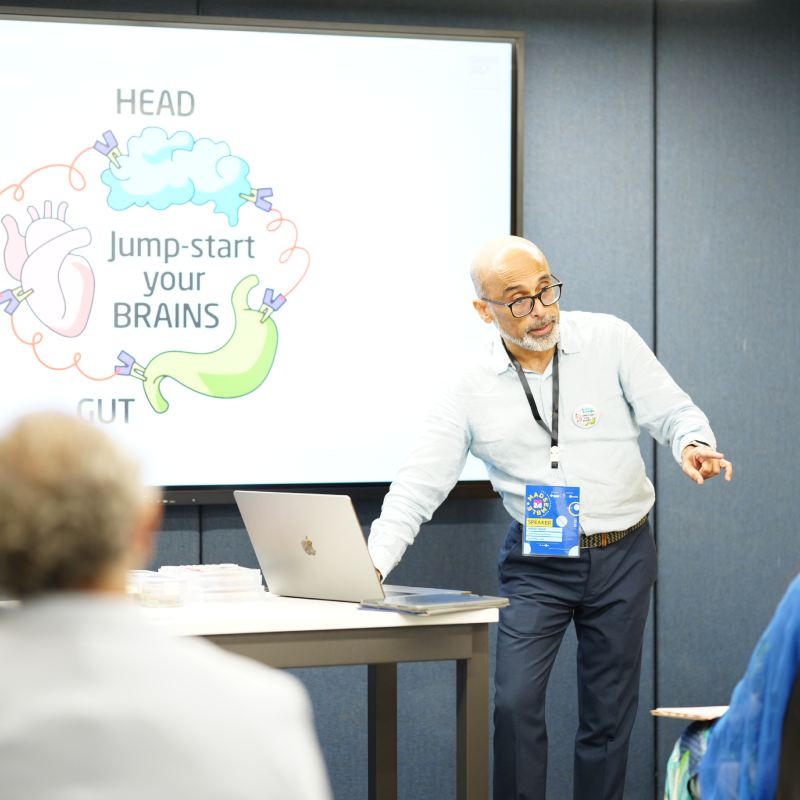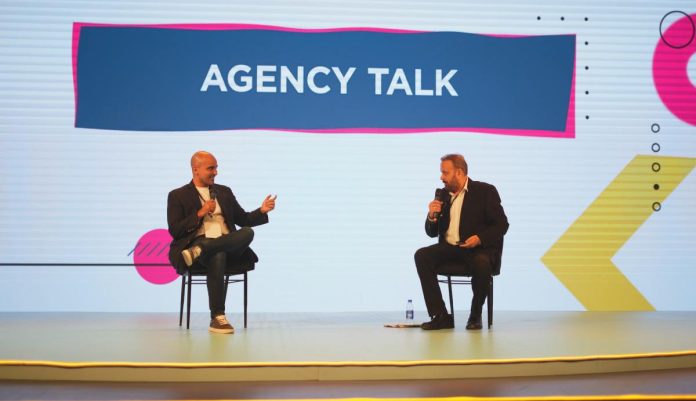Madsemble 2024
Step into the vibrant world of Madsemble 2024, where creativity collides with innovation in a dazzling display of marketing genius! This electrifying event brought together the brightest minds in advertising and marketing. From igniting conversations, and captivating keynotes to engaging panels, attendees left buzzing with fresh ideas and strategies to conquer the ever-shifting landscape of the industry. With a focus on authenticity, emotional connections, and niche storytelling, Madsemble wasn’t just an event but a transformative experience.
On a dull Monday evening at work last month where things seemed to be moving at a snail’s pace. My phone buzzed with a message from a colleague, “You are invited to Madsemble.” The message I had been anticipating. For those who aren’t aware, Madsemble is an annual event, organised by the Pakistan Advertisers Society (PAS), bringing the marketing and advertising leaders from all over the world together under one roof. Madsemble 2024 – a two-day event was held recently at the National Aerospace Science & Technology Park (NASTP) in Karachi on September 25th and 26th.
Day 1 – Brand Building
Speakers:
1- Sudhir Sitapati, Chief Executive Officer of Godrej Consumer Products
2- Farheen Salman Amir, President – BSPAN & GM Pakistan
3- Nadeem Zaman, Business Growth Leader Baby & Child, Kimberly-Clark.
4- Shahzain Munir, The English Biscuit Manufacturers’ (EBM)’s Executive Director
5- Dolly Saidy, Founder of MINTMENA
6- Saad Tawwab Khan Rao, Chief Marketing & eCommerce Officer for Pakistan & Afghanistan at Samsung Electronics
7- Samar Hayat, CEO of Tapal Tea
8- Sheikh Adil Hussain, Marketing Director of Haircare, Unilever
9- David Wheldon, President Emeritus, World Federation of Advertisers

Sudhir Sitapati – “Technology changes, human behaviour doesn’t.”
- The CEO of Godrej Consumer Products, Sudhir Sitapati delivered his keynote speech online. His session was moderated by President of BSPAN & GM Pakistan, Farheen Salman Amir whose energy kept the attendees engaged even when the session was disrupted briefly due to laggy internet.
- In a world of ever-evolving marketing strategies, Sudhir’s session was a much-needed reminder of the fundamentals of brand marketing. As flashy new trends and digital platforms have emerged. Many marketers seem to forget the core principles that have always driven brand success. “Technology changes,” Sitapati began, “but human behaviour doesn’t. The basics of brand marketing are still as relevant as ever.” He emphasised the importance of consistency, authenticity, and the emotional connection that a brand should foster with its audience.
Nadeem Zaman – The Brand Love Pyramid
- Nadeem Zaman’s, Business Growth Leader Baby & Child, Kimberly-Clark. He is the brains behind the creation of Coke Studio Pakistan.
- Speaking about brand advocacy. He argued that the best form of brand advocacy is when a brand becomes a part of your culture. He spoke at length about the Brand Love Pyramid. Explaining the steps – Know, Accept, Like, Love, and Exclusive Love – along the way.
- Brand love translates into increased brand consumption. An example of which was shared by him in the form of Coke Studio Pakistan. Nadeem shared how the team identified a real human problem, economic and political crises that Pakistanis faced and then came up with an inspirational solution.
- There are two things that unite Pakistanis, no matter what, it’s music and cricket. By the end of Nadeem’s speech. I had realised I would be walking out as a better marketer and advertiser, even if I am neither of those!
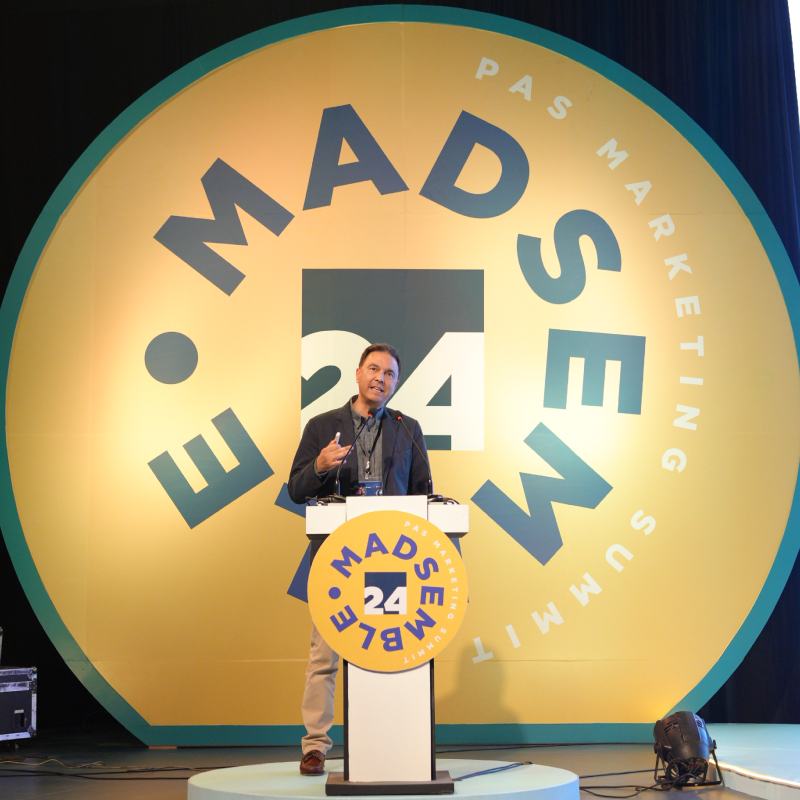
Shahzain Munir – Sooper’s Success
- The English Biscuit Manufacturers’ (EBM)’s Executive Director Shahzain Munir took to the podium. He shared EBM’s inspiring business journey and growth with everyone.
- Shahzain’s aspirations to make ‘Sooper’ the world’s favourite biscuit brand after it became the nation’s favourite.
- It was refreshing to hear the thoughts of a leader of a local brand whose ambitions were to make a Pakistani brand a household name overseas. Not only did it strike a chord with the attendees, as their thunderous applause also echoed throughout the hall. It was a testament to their belief in EBM’s ability to live up to its promise.
Dolly Saidy – Go Local!
- The founder of MINTMENA, Dolly Saidy, emphasised the critical need to resist urgency. Especially when it compromises production quality, costs, and the overall impact of an ad.
- “Efficiency in advertising is about delivering high-quality work without sacrificing timelines, but rushing through projects can lead to subpar results, missed airing dates, and higher long-term costs,” she illustrated.
- Dolly highlighted the importance of shooting locally, noting that while shooting abroad may seem glamorous, it often compromises on cultural authenticity, inflates budgets, and hinders the development of local talent. “We need to invest in our local industry, offering the right budget and believing in the capabilities of local production teams to deliver superior outcomes.”
- Saidy further stressed the importance of balancing the budgets allocated for music and production, urging brands not to compromise on either. “Empowering local talent and ensuring they have the resources to create high-quality content will lead to better results, while also driving growth within the industry, and the country” she stated.
- The founder encouraged industry leaders to take risks, challenge conventional habits, and foster healthy competition without settling for less. By focusing on developing local talent and maintaining high standards, brands would not only achieve remarkable results but also contribute to the long-term growth and sustainability of the advertising landscape.
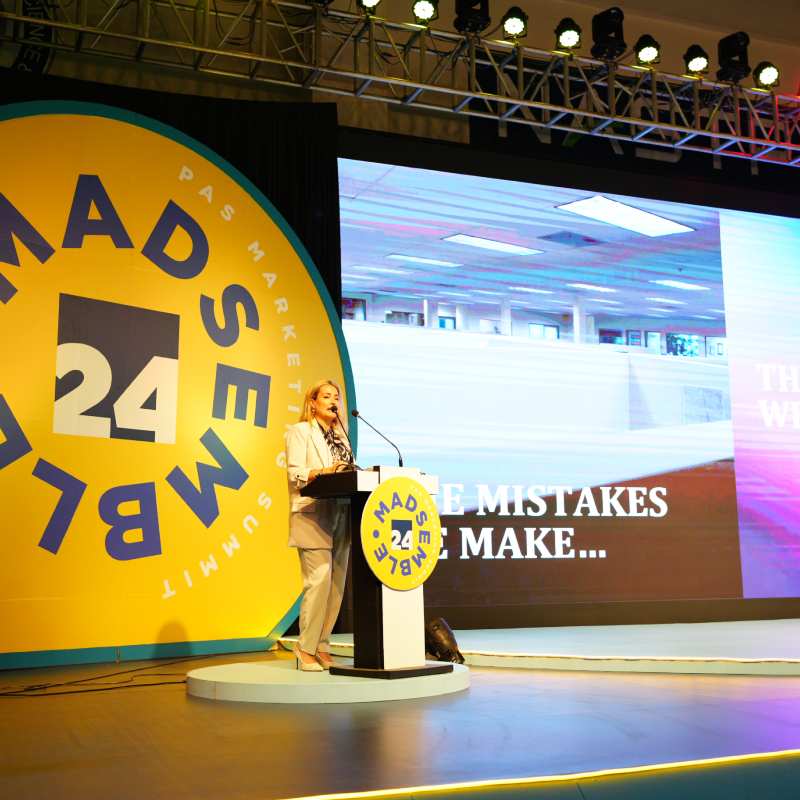
Saad Tawwab Khan Rao – Connect with Emotions
- Saad Tawwab Khan Rao, Chief Marketing & eCommerce Officer for Pakistan & Afghanistan at Samsung Electronics, highlighted the importance of driving effectiveness in marketing by tapping into core human emotions.
- “Brands that connect with emotions have a lasting impact,” he said, citing Dalda’s iconic campaign “Jahan Dalda, Wahan Mamta” as an example. He revisited this emotional narrative, Dalda successfully appealed to the basic sentiment of maternal love, which resonated deeply with audiences.
- Saad explained that ads measured with higher elements of happiness or surprise tend to be significantly more effective, signifying the importance of emotional engagement in brand-building.
- “Emotions build brands; neutrality does nothing,” Saad stated plainly, stressing that branding alone doesn’t drive ad-likeability, producing content that fails to connect emotionally isn’t just ineffective, it’s detrimental. Saad declared, “There’s no room for producing mediocre content in today’s competitive landscape,” urging marketers to focus on creating high-quality, emotionally relatable advertisements.
- According to him, producing content without strong emotional appeal leads to resources wasted and opportunities missed to strengthen a brand’s market presence.
Samar Hayat – Emotions over efficiency
- Samar Hayat, CEO of Tapal Tea, began with the critical role of strategic choices, which play in determining whether businesses will thrive or fail.
- Drawing parallels with industry giants like Microsoft and Apple, as well as Fujifilm and Kodak.
- Samar emphasised how the right decisions can set a company on a path
of innovation and sustained growth. “It’s not just about the choices we make, but understanding what and who is driving those choices,” he explained, urging business leaders to be mindful of internal forces shaping their strategies, trying to identify inherent problems within corporate structures to create a winning framework that fosters success. “Too often, organisations become fixated on operational excellence, but that alone will not be enough to guarantee growth.”
- Samar shared the significance of emotions in advertising, like Saad Tuwwab Khan, stating that a strong emotional connection with consumers is a powerful driver for brand loyalty and overall market success.
- “Emotions resonate with audiences in a way that operational efficiency cannot,” he said. Samar cautioned against companies focussing solely on operational metrics, reminding them that growth is also fuelled by how well a brand connects with its audience on a personal level.
- By balancing strategic decision-making with emotional engagement, businesses can not only overcome internal challenges but also secure long-term growth in a competitive marketplace.
Sheikh Adil Hussain – Cracking the Gen-Z code
- The energy in the room spiked when the Marketing Director of Haircare, Sheikh Adil Hussain, took over the stage. His mission was clear, to debunk the many misconceptions about how to communicate with Gen-Z.
- He conducted a fun session with industry experts and two youngsters representing Gen-Z.
- In a thoroughly illuminating session, Adil laid out the findings of a groundbreaking study conducted by Pulse Market Research, which was led by Kashif Hafeez Siddiqui.
- The research painted a nuanced picture of Gen-Z; asserting that, this generation wasn’t just tech-savvy and socially conscious but they were also emotionally intelligent, value-driven, and incredibly discerning.
- “The key to reaching Gen-Z isn’t just about jumping on trends,” Adil stated, as reverberated by the two youngsters sitting on the panel. “It’s about authenticity. They can spot a fake from a mile away.”
- He argued that brands must be transparent and genuinely aligned with their values, if they ever hope to win over this generation. Gen-Z wasn’t just buying products; they were buying into causes, beliefs, and experiences.
David Wheldon OBE – Choose your Own
- The last session of Day 1 was hosted by President Emritus, David Wheldon OBE who has 40 years of experience in the industry.
- He revealed the importance of branding and hosted an incredibly enjoyable and insightful session with the Chairman and CEO of Unilever, Amir Paracha, CEO of Dalda Foods, Aziz Jindani, and Managing Director of Daraz Pakistan and Sri Lanka, Ehsan Saya.
- The trio discussed the importance of branding in today’s cluttered market. Aziz, ever the critic, challenged the traditional notion of a brand manager, questioning whether the title truly reflected the responsibilities that came with it.
- His sharp analysis opened the floor to a broader conversation about how the role of brand managers needed to evolve to stay relevant in today’s digital-first world.
- Meanwhile, Ehsan emphasised the importance of building in-house creative teams. “Companies can’t rely on external agencies to understand the nuances of your brand,” Ehsan argued. “An in-house team lives and breathes the brand every day. They get it.”
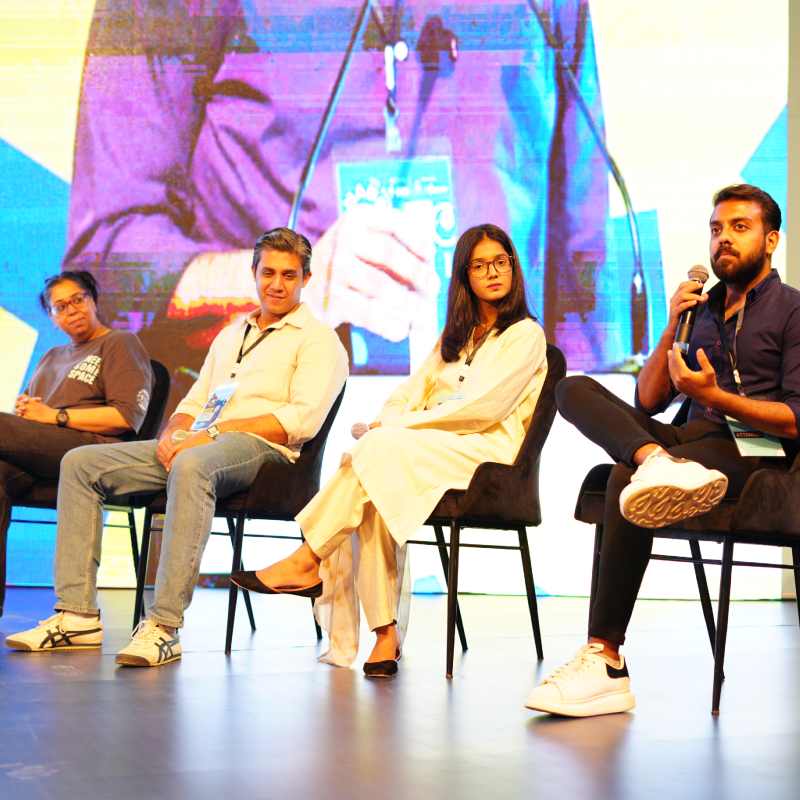
Day 2 – Changing Mindsets
Speakers:
1- Mark Adams, Vice President & Head of Innovation, VICE Media
2- Hasan Sandila, Vice President – Digital Division, Jazz
3- Adil Ahmed, Director & Co-Founder, Symmetry Group
4- Ahmed Kapadia, Chairman & CEO, Synergy Group
5- Faisan S. Syed, Founder & CEO, East River
6- S. Zaheeruddin Ahmed, CEO, Dareechay Films / COO & Film Director iDcreations
The conference hall, buzzing with energy, the air thick with anticipation as marketing professionals, creative minds, and industry leaders gathered for what was to become one of the most insightful and thought-provoking sessions of the year. A convergence of ideas, opinions, and futuristic visions on the world of advertising and marketing. The session promising to reshape how brands approach their audiences in the ever-evolving digital landscape.
Umair Saeed, the former CEO of Blitz Advertising
hosted the event on both days. Before he could even begin the announcement, his excitement was contagious. The real show was about to begin. The second day kicked off with the Health and Wellness Ambassador from Jubilee Insurance, Mantaha Tareen, elucidating about the management of cortisol levels is especially necessary for those working in the marketing and advertising industry. She encouraged the attendees to stand up from their seats for a 5-minute exercise and did a physical activity session to make participants aware if their cortisol levels were normal.
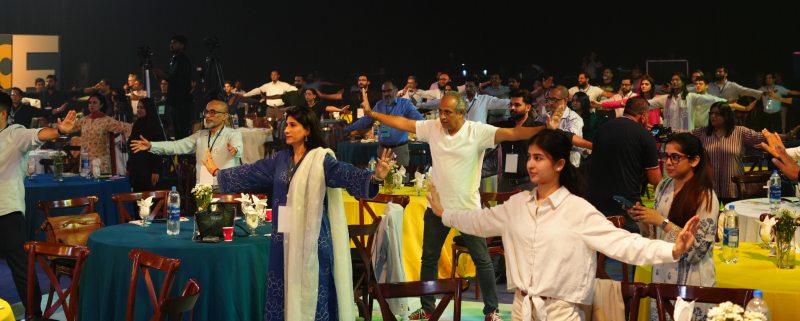
Mark Adams – The Great Mark
- Mark, a dynamic speaker known for his disruptive, unconventional ideas, took the stage and immediately captured the audience’s attention. He began by dismissing the traditional audience targeting and segmentation methods, calling them the ‘relics of the past.’
- “Segmenting your audience? The old way sucks,” he declared. “It’s like throwing darts in the dark and hoping to hit something.” His words stunned with the crowd, many of who had already been grappling with the rapidly changing digital landscape. Where old methods no longer seemed to be effective.
- Mark continued to elaborate on a revolutionary concept that was shaking up the industry: niche marketing. He explained, it’s no longer about simply advertising to people. Instead, marketers need to create niches of interest, dedicated communities with shared values and passions. This approach, he elucidated, allows brands to not only exist “on the internet” but truly “live in it.’
- Mark described this idea as creating and spreading myths – meaningful, yet transformative narratives that align with the culture of niche communities. “People are no longer passive recipients of ads, they are participants in stories, and brands need to craft stories that people can believe in, stories that they want to share.” Mark explained to the growing crowd.
- The idea of creating a myth that resonates with a niche community was a game-changer. It wasn’t about casting a wide net, but rather, becoming a meaningful part of a people’s digital identity. Mark’s vision of living in the internet, rather than just placing ads on it, piqued new understanding.
- Brands had to find ways to become an integral part of their audience’s culture.
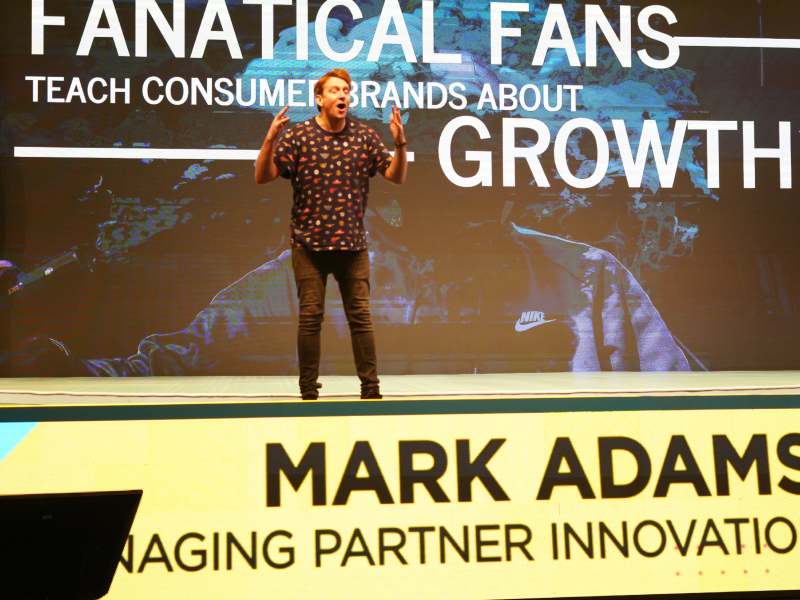
Hasan Sandila – “Digital is here, and it’s here to stay.”
- Hasan Sandila, the VP of Digital Products & Growth briefed on the dynamics of digital viewership and the rise of OTT platforms in Pakistan.
- He discussed the insights on the growing parity between digital and TV viewership during big-ticket events and explained how digital viewership had evolved, reaching a point where it now rivalled TV during major events.
- “We’re no longer living in a world where TV dominates everything,” Hasan noted. “Digital is here, and it’s here to stay.”
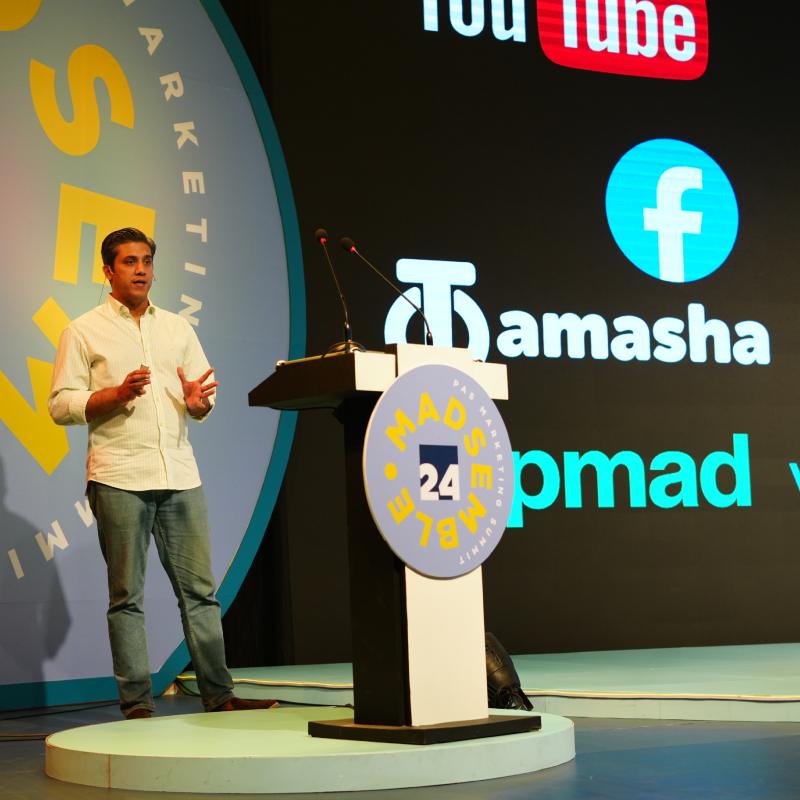
Ammar Hassan – How to Make a Bad Marketer.
- Sandila’s session was followed by Growth Consultant Ammar Hassan, who shared the recipe on ‘how to make a bad marketer.’
- “Marketing as a profession is in serious danger. For the last 15 years, we’ve been churning out marketers who lack the foundational skills needed to truly excel. We’ve focussed too much on trends and short-term wins that we’ve neglected the core principles of marketing. This has resulted in a generation of ‘bad marketers’ who aren’t equipped to lead in today’s fast-changing landscape,
” commented Ammar. - He continued, “with the rise of AI and the demand for digital transformation, marketers must ask themselves: are we truly prepared for the future? And can we effectively communicate AI’s value to our CFOs in a way that impacts the bottom line? If we can’t bridge this gap now, how can we even aspire to become CEOs? To thrive, today’s marketers need to evolve beyond traditional tactics and communication in the language their CFOs understand.”

Adil Ahmed – “Human creativity will not be replaced”
- The take on the marketing of the future was unveiled by Abbas Arslan, who took over the stage to reveal his work on creating a digital-video-Quran using generative AI.
- His presentation wasn’t just about showcasing cutting-edge technology but offering a glimpse into the future of marketing and technology.
- Generative AI, he explained, was going to revolutionise everything from content creation to audience engagement.
- Adil Ahmed joined the conversation, sharing his thoughts on AI. From personalised ads to AI-generated creative campaigns, the future; according to Adil, was one where human creativity would be augmented, not replaced, by machines as many predict.
- He went on to say that the incoming wave of AI is hard to stop but it will help marketers achieve their dream of coming up with hyper-personalised campaigns.
Ahmed Kapadia – A bold new perspective
- Founder and CEO East River Faizan S. Syed’s and Chairman and CEO Synergy Group Ahmed Kapadia’s interaction was a breath of fresh air, offering a bold new perspective for the future of Pakistani advertising.
- Both of them focussed on how ad agencies in Pakistan could compete on a global scale.
- Faizan laid out a roadmap, advocating for increased investment in talent, training, and technology. “We have the creative minds,” Faizan asserted. “What we need is the ambition to go and showcase our expertise on the world stage,” Ahmed remarked.
Zaheeruddin Ahmed – Fakeness in Pakistani Adverts
- The reality check on the current state of advertising in Pakistan came from S. Zaheeruddin Ahmed, whose relaxed demeanour masked the profound impact of his words.
- Zaheer spoke frankly about the fakeness in Pakistani ads and why they often fail to resonate with the audience. “We see ads where the actors look like they’ve walked off a Bollywood set, speaking in a language that no one actually uses in real life,” Zaheer said, eliciting chuckles from the audience.
- “It’s time we start casting relatable talent, talking in the language of our people, and using real-life settings, that is when it’ll be most impactful.”
- His message was clear: authenticity is not just for global brands or Gen-Z. It’s crucial for any advertisement to succeed. He petitioned for a shift towards storytelling that reflects the realities of everyday life in Pakistan. Ads, he argued, “should be mirrors of the society they target, not glamorised versions of it.”
As the event drew to a close, the audience was recovering from the blast of new ideas and fresh perspectives. The energy that had filled the room on both days began to settle, replaced by a sense of anticipation about the future of marketing in Pakistan. The event had covered everything from the basics of brand marketing to the cutting edge of AI, the attendees walked away with a deeper understanding of where the industry was heading. As the lights dimmed and the audience slowly filtered out, there was a shared sentiment: this event had not just been a meeting of minds, but a turning point for marketing in Pakistan. The future was bright, the possibilities endless, and everyone in attendance was ready to embrace the next wave of innovation.
